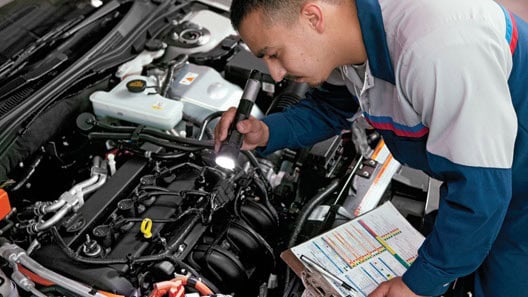Brake Fluid in Ford Trucks: Function, Maintenance, and Care
Brake fluid is a critical component in the braking system of Ford trucks, playing a vital role in ensuring safe and effective vehicle operation. This guide will explore how brake fluid works, when to replace it, what it should look like, how to check it, and what to expect during brake fluid maintenance at a … Continued
Brake fluid is a critical component in the braking system of Ford trucks, playing a vital role in ensuring safe and effective vehicle operation. This guide will explore how brake fluid works, when to replace it, what it should look like, how to check it, and what to expect during brake fluid maintenance at a Ford dealership.

How Brake Fluid Works in Ford Trucks
Brake fluid is the lifeblood of your Ford truck braking system, facilitating the transfer of force from the brake pedal to the brake pads. Here’s a breakdown of its function:
Hydraulic Principle
- When you press the brake pedal, it activates a piston in the master cylinder.
- This piston pressurizes the brake fluid in the brake lines.
- The pressurized fluid travels through the brake lines to the brake callipers or wheel cylinders.
- The fluid pressure is converted into mechanical force at the callipers or wheel cylinders, pressing the brake pads against the rotors or drums.
Key Properties of Brake Fluid
- Incompressibility: Brake fluid doesn’t compress under pressure, ensuring efficient force transfer.
- High Boiling Point: It resists boiling under high temperatures generated during braking.
- Low Freezing Point: It remains liquid in cold temperatures, ensuring year-round functionality.
- Corrosion Resistance: It protects metal components in the braking system from rust and corrosion.
When to Replace Brake Fluid in Ford Trucks
Ford has specific recommendations for brake fluid replacement, but these can vary depending on the model year and specific truck model. Here are some general guidelines:
- Time-Based Replacement:
- For most Ford trucks manufactured from 2020 onwards, Ford recommends changing the brake fluid every 3 years.
- The recommendation may vary for older models, but a 2-3 year interval is generally advisable.
- Mileage-Based Replacement:
- While Ford doesn’t typically specify a mileage-based interval, many mechanics recommend changing brake fluid every 50,000 to 70,000 kilometers.
- Condition-Based Replacement:
- If the brake fluid appears dark or contaminated during a routine check, it should be replaced regardless of time or mileage.
- After Major Brake Work:
- A fluid change is often recommended if you’ve had significant brake repairs, such as calliper replacement or brake line work.
How Brake Fluid Should Look
Healthy brake fluid has specific visual characteristics:
- Colour:
- New brake fluid is typically clear with a slight yellow tint.
- As it ages, it may darken to amber or light brown.
- Clarity:
- Fresh brake fluid should be clear and transparent.
- If it appears cloudy or has visible particles, it needs replacement.
- Consistency:
- Brake fluid should have a smooth, oil-like consistency.
- If it feels gritty or has a syrupy texture, it’s time for a change.
How to Check Brake Fluid in Ford Trucks
Regular brake fluid checks are an essential part of vehicle maintenance. Here’s how to check your Ford truck brake fluid:
- Locate the Reservoir:
- The brake fluid reservoir is typically on the driver’s side of the engine compartment.
- It’s usually a translucent plastic container with “Brake Fluid” marked on the cap.
- Check the Level:
- With the vehicle on level ground, look at the side of the reservoir.
- There should be “MIN” and “MAX” lines marked on the side.
- The fluid level should be between these lines, ideally closer to “MAX”.
- Inspect the Fluid:
- Without opening the reservoir, examine the colour and clarity of the fluid.
- If it’s dark or cloudy, it may need replacement.
- Check for Leaks:
- Look under the vehicle for any signs of fluid leaks.
- Check around the wheels and brake lines for wet spots or stains.
- Professional Inspection:
- If you’re unsure about the condition of your brake fluid, have it checked by a professional during your next service appointment.
Brake Fluid Maintenance at a Ford Dealership
When you take your Ford truck to a dealership for brake fluid maintenance, you can expect a thorough service process:
- Inspection:
- The technician will visually inspect the brake fluid level and condition.
- They’ll check for any signs of leaks or contamination in the system.
- Testing:
- Many dealerships use electronic testers to check the fluid boiling point and moisture content.
- This gives a more accurate assessment of the fluid condition than visual inspection alone.
- Flushing and Replacement:
- If replacement is needed, the technician will perform a complete brake fluid flush.
- This involves removing all old fluid from the system and replacing it with new, Ford-approved brake fluid.
- Bleeding the System:
- After replacing the fluid, the technician will bleed the brake system to remove air bubbles.
- This ensures optimal brake performance and pedal feel.
- Final Check:
- The dealership will test your brakes to ensure proper operation and pedal feel.
- The technician will check for any leaks in the system.
- Documentation:
- The service will be recorded in your vehicle’s maintenance history.
- You’ll receive documentation of the service performed.
The Importance of Using the Correct Brake Fluid
Ford specifies the type of brake fluid for each truck model. It’s crucial to use the correct type to ensure optimal performance and safety:
- DOT 3: Used in many older Ford truck models.
- DOT 4: The most common type used in modern Ford trucks.
- DOT 5.1: Used in some high-performance or heavy-duty applications.
Using the wrong type of brake fluid can damage the brake system, reduce performance, or even cause brake failure. Always consult your owner’s manual or a Ford technician to ensure you use the correct fluid for your truck model.
Signs That Your Brake Fluid Needs Attention
Be aware of these signs that may indicate issues with your brake fluid:
- Spongy Brake Pedal: If the brake pedal feels soft or spongy, it could indicate air in the brake lines or degraded fluid.
- Warning Light: Many Ford trucks have a brake warning light that may illuminate if the fluid level is low.
- Burning Smell: A sharp, chemical odour while braking could indicate overheated brake fluid.
- Leaks: Puddles or stains under your vehicle might be brake fluid leaks.
- Reduced Braking Performance: If your truck takes longer to stop or the brakes feel less responsive, it could be due to brake fluid issues.
DIY vs. Professional Brake Fluid Maintenance
While some truck owners may want to perform brake fluid maintenance themselves, there are several reasons to consider professional service:
- Specialized Equipment: Proper brake fluid flushing requires specialized equipment to ensure all old fluid is removed and the system is correctly bled.
- Safety: Brake fluid is hygroscopic (absorbs moisture from the air) and can be harmful if mishandled. Professionals have the necessary safety equipment and disposal procedures.
- Diagnostic Capabilities: Dealerships can perform electronic brake fluid testing, providing a more accurate assessment of its condition.
- Warranty Considerations: Having brake fluid maintenance performed by a Ford dealership ensures that your warranty remains intact.
- Expertise: Ford-trained technicians are familiar with the specific requirements of different Ford truck models, ensuring the correct procedures.
Environmental Considerations
Brake fluid is considered hazardous waste and must be disposed of properly. Ford dealerships and authorized service centers have proper disposal procedures in place, ensuring that used brake fluid doesn’t harm the environment.
Maintain the Brake Fluid in Ford Trucks
Proper brake fluid maintenance is crucial for the safety, performance, and longevity of your Ford truck. By understanding how brake fluid works, when to replace it, and how to check it, you can ensure your braking system remains in optimal condition. Regular inspections and timely replacements at a Ford dealership or authorized service center will help keep your truck stopping safely for years to come.
Remember, while this guide provides general information, always consult your specific Ford owner manual for model-specific recommendations and maintenance schedules. Your safety on the road depends on properly maintained brakes, and brake fluid is a critical component of that system.


